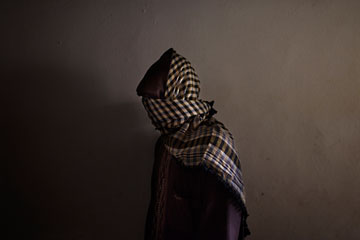
A member of Boko Haram, in a suburb of Kano, Feb. 12 2012.
When the police truck pulled up at the morgue at the main hospital in the northeastern Nigerian city of Maiduguri on the morning of May 9, the doctors working there explained that they only had space for two more bodies. The government was about to launch a major offensive against the Islamist group Boko Haram, casualties were already rising steeply, and the hospital's morgue — which could hold 40 bodies — was full.
That was not what the 10 grief-stricken police officers who accompanied the truck wanted to hear. Inside the truck were the swollen, decomposing bodies of more than 30 of their comrades, who had been killed by members of Boko Haram in an attack on a police station in the nearby town of Bama. All the staff at the Maiduguri Teaching Hospital could do for the dead, they explained, was treat the bodies with the preservative formalin before transferring them to another morgue. When the medics began pouring the liquid over the bodies, the increasingly agitated officers erupted in fury. "I heard gunshots and saw people running," says Abba Kabir, a resident doctor who was recovering from the incident in a bed at the hospital when TIME visited recently. Even before the shooting began, an officer had beaten Kabir and two female health workers. While running away from the soldier, Kabir hit and fractured his leg on a door. "We will kill everyone in the hospital," the policemen shouted, recalls Kabir, "because you are not treating our corpses with respect!"
The policemen stalked the dimly lit halls, firing shots into the ceiling and into doors, smashing windows and televisions. The hospital staff found themselves terrorized by the men who were meant to be protecting them. Eventually, at the insistence of soldiers who intervened, they left. "We were surprised that the police had turned on us," says another doctor, Mohammed Yahaya.
On May 14, the Nigerian government expanded its fight against Boko Haram, declaring a state of emergency in three states in the northeast — including Borno, the capital of which is Maiduguri — and launching a full-fledged military campaign, with the assistance of the police, to defeat Boko Haram. So far, the offensive has destroyed bases belonging to the al-Qaeda-allied Boko Haram and captured more than 150 suspected insurgents, according to the military, which says the campaign has been a broad success.
But a rare visit to the heart of the insurgency in Maiduguri by a reporter for TIME reveals a disturbing picture of a continuing battle marked by combatant deaths and human-rights abuses on both sides. Eyewitness allegations of summary arrest, torture and other abuses by the security forces — one barracks in Maiduguri is locally known as "the concentration camp" — have created ill feeling among residents of the northeast who generally feel little affection for the extremists. Analysts and Washington policymakers say the offensive may have pushed some Boko Haram militants out of Nigeria and into neighboring countries, giving them a chance to regroup and create ties with militants in other West African nations. The campaign may even have scattered Boko Haram members to parts of the country they have never previously attacked. And in spite of gains made by the security forces, the militants continue to attack in familiar locations. On Aug. 4 the insurgents launched assaults on a police station and a military base in Borno; 35 people — most of them militants — died in the assaults, the government said.
The escalation in violence and the potential spread of militancy in the region is of increasing concern in Washington. Boko Haram bombed the U.N. headquarters in the capital city of Abuja in 2011 and has attacked schools. After the attack on the U.N. headquarters, the group released a video decrying the U.S. President and "other infidels." "Boko Haram's repeated displays of brutality, its intent to commit terror attacks against an expanding list of targets and its relationships with al-Qaeda affiliates — all in a country of strategic significance to the U.S. — is an enormous counterterrorism and intelligence challenge," said Representative Patrick Meehan, then chairman of the House Subcommittee on Counterterrorism and Intelligence, in a speech about the group to the Heritage Foundation in July 2012.
In June, the U.S. government offered a $7 million reward for information leading to the capture of Boko Haram's leader. By comparison, that's just $3 million less than the State Department is offering for Taliban leader Mullah Mohammed Omar and $2 million more than is on offer for one of the bombers of the U.S.S. Cole in October 2000. "Although [Boko Haram and other groups in the region] may not have the same transnational capacity that some of the earlier organizations did, they're doing great harm in Africa and in the Middle East and in South Asia," President Obama said on June 29 in Soweto, South Africa.
Washington's contribution to the Nigerian government's fight against Boko Haram comes in the form of shared intelligence, logistics, training, political backing and funding for law enforcement. The military claims that together, the U.S. and Nigeria have been remarkably effective. "Will you compare such a situation to what it was before the operation? Definitely not. They were terrorizing every member of society," says Brigadier General Chris Olukolade, a military spokesman. "The success of the operation is that they are being rooted out of their various places, and they don't have freedom of action anymore in Nigeria."
